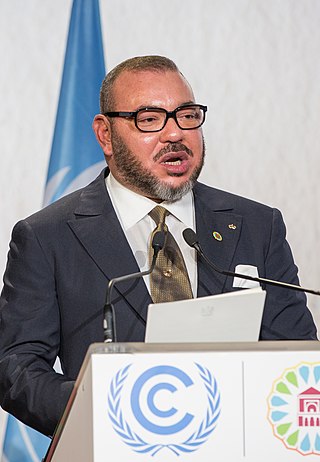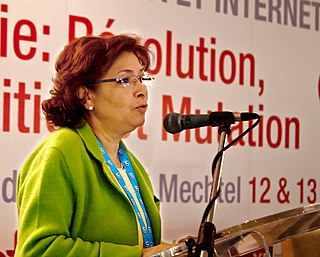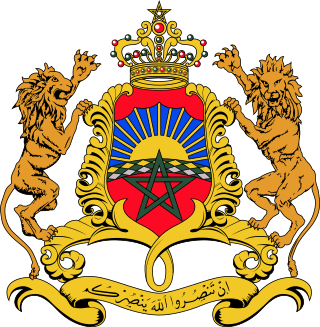Related Research Articles

Tunisia, officially the Republic of Tunisia, is the northernmost country in Africa. It is a part of the Maghreb region of North Africa, bordered by Algeria to the west and southwest, Libya to the southeast, and the Mediterranean Sea to the north and east. It features the archaeological sites of Carthage dating back to the 9th century BC, as well as the Great Mosque of Kairouan. Known for its ancient architecture, souks and blue coasts, it covers 163,610 km2 (63,170 sq mi), and has a population of 12.1 million. It contains the eastern end of the Atlas Mountains and the northern reaches of the Sahara desert; much of its remaining territory is arable land. Its 1,300 km (810 mi) of coastline include the African conjunction of the western and eastern parts of the Mediterranean Basin. Tunisia is home to Africa's northernmost point, Cape Angela. Located on the northeastern coast, Tunis is the capital and largest city in the country. Tunisia is named after Tunis.

Mohammed VI is the King of Morocco. He belongs to the 'Alawi dynasty and acceded to the throne on 23 July 1999, upon the death of his father, King Hassan II.

The Maghreb, also known as the Arab Maghreb and Northwest Africa, is the western part of the Arab world. The region comprises western and central North Africa, including Algeria, Libya, Mauritania, Morocco, and Tunisia. The Maghreb also includes the disputed territory of Western Sahara and the Spanish cities Ceuta and Melilla. As of 2018, the region had a population of over 100 million people.

Zine El Abidine Ben Ali, commonly known as Ben Ali or Ezzine, was a Tunisian politician who served as the 2nd president of Tunisia from 1987 to 2011. In that year, during the Tunisian revolution, he fled to Saudi Arabia.

Hassan II was King of Morocco from 1961 until his death in 1999.

IFEX, formerly International Freedom of Expression Exchange, is a global network of 124 independent non-governmental organisations that work at a local, national, regional, or international level to defend and promote freedom of expression as a human right.

Prince Moulay Rachid of Morocco, also known as Prince Moulay Rachid ben al-Hassan, is a member of the Alawi dynasty. He was the youngest child of the late King Hassan II and his wife, Lalla Latifa Hammou. He holds a doctorate in international politics. He is currently second in the line of succession to the Moroccan throne.

PEN International is a worldwide association of writers, founded in London in 1921 to promote friendship and intellectual co-operation among writers everywhere. The association has autonomous International PEN centers in more than 100 countries.
The Tunisia Monitoring Group (IFEX-TMG) is a coalition of 21 free-expression organisations that belong to the International Freedom of Expression Exchange (IFEX), a global network of non-governmental organisations that promotes and defends the right to freedom of expression and freedom of the press.
The Independence Intifada or the Second Sahrawi Intifada and also May Intifada is a Sahrawi activist term for a series of disturbances, demonstrations and riots that broke out in May 2005 in the Moroccan-controlled parts of Western Sahara and south of Morocco. This event has also been called The El-Aaiun Intifada by the same sources.

Sihem Bensedrine is a Tunisian journalist and human rights activist. In 2005, she was honored with the Oxfam Novib/PEN Award.
Censorship in Tunisia has been an issue since the country gained independence in 1956. Though considered relatively mild under President Habib Bourguiba (1957–1987), censorship and other forms of repression became common under his successor, President Zine El Abidine Ben Ali. Ben Ali was listed as one of the "10 Worst Enemies of the Press" by the Committee to Protect Journalists starting in 1998. Reporters Without Borders named Ben Ali as a leading "Predator of Press Freedom". However, the Tunisia Monitoring Group reports that the situation with respect to censorship has improved dramatically since the overthrow of Ben Ali in early 2011.

Morocco became a highly repressive country under the absolute monarchy of King Hassan II, and continues to be considered repressive under the reign of King Mohammed VI, though the latter has instituted some reforms. Dozens of journalists, artists, and ordinary citizens are regularly sentenced to lengthy prison sentences for exercising basic rights enjoyed elsewhere in the world, such as freedom of the press, protesting the government, or criticizing government officials. Morocco heavily restricts basic human rights, such as freedom of speech, the right to assembly, and the right to criticize officials. Moroccans also feel the pressures of inflation within the country, such as the lack of basic services like healthcare, clean water, and the difficulty of parents to access quality education for their children. While there have been a handful of reforms that have been generally welcomed internationally, most Moroccans feel this is insufficient, and continue to be unhappy with the trajectory of the country under the policies of King Mohammed VI, despite his transition of the government to an ostensible constitutional monarchy. Under his father, King Hassan II, Morocco had one of the worst human rights records in Africa and the world, especially during the time period known as the "Years Of Lead", which lasted from the early 1960s until the late 1980s; it was a period in the country's history that was known for the brutal repression of political dissent and opposition, that involved wide-scale arrests, arbitrary detention, lengthy imprisonment, and even killings of political opponents. Currently, Morocco continues to face some of these issues, as well as other human rights problems, such as poor prison conditions, the mistreatment of women and the LGBT community, and the widespread use of torture by police. Despite the considerable improvements made in the last several years under the leadership of King Mohammed VI, who has rolled back some of his father's harshest decrees, repression of political dissidence, and torture of citizens by officials, is still commonplace in Morocco today.
Internet censorship in Morocco was listed as selective in the social, conflict/security, and Internet tools areas and as no evidence in the political area by the OpenNet Initiative (ONI) in August 2009. Freedom House listed Morocco's "Internet Freedom Status" as "Partly Free" in its 2018 Freedom on the Net report.

Leïla Ben Ali is the widow of Zine El Abidine Ben Ali, who was President of Tunisia from 1987 to 2011. She married Ben Ali in 1992.

Mohamed Moncef Marzouki is a Tunisian politician who served as the fifth president of Tunisia from 2011 to 2014. Through his career he has been a human rights activist, physician and politician. On 12 December 2011, he was elected President of Tunisia by the Constituent Assembly.
Ghazi Beji and Jabeur Mejri are Tunisian citizens sentenced on 28 March 2012 to 7.5 years' imprisonment for "transgressing morality, defamation and disrupting public order" after posting naked caricatures of Muhammad to Facebook. Mejri faced trial in court, while his friend Beji was convicted in absentia, having fled to Europe to escape prosecution. Mejri's appeal of his sentence was denied on 25 June 2012. Mejri's lawyer objected to his client being denied medical evaluation, describing him as "mentally unstable" and unemployed for the past six years.
Saad Lamjarred is a Moroccan singer, actor, singer-songwriter, multi-instrumentalist, dancer, and record producer. His official music video for "LM3ALLEM" has received over 1 billion views on YouTube; he has had over 4 billion views and 14 millions subscribers on his YouTube channel.
Weld El 15, real name Ala Edine Yacoubi, is a Tunisian rapper. Ala is born in 1988 in Tunis. At the age of 15, he started to write his first texts under the pseudonym "Weld El 15".
Éric Laurent is a French journalist who is best known for his work on the finance and geopolitics of the oil business, and for his work on Morocco and its government.
References
- ↑ "Two Norwegian Journalists Threatened with Expulsion". Reporters Without Borders. 16 June 2004. Retrieved 1 September 2015.
- ↑ "Two Norwegian journalists threatened with expulsion - IFEX". ifex.org. 17 June 2004. Retrieved 14 November 2018.
- ↑ "President's promises must be followed by action, says RSF". IFEX. 14 January 2011. Retrieved 14 November 2018.
- ↑ "Student handed one year prison sentence for posting cartoon of the king on Facebook". IFEX. 29 February 2012. Retrieved 14 November 2018.
- ↑ Bremner, Charles (1 September 2015). "Arrested writers 'were saving Morocco'" . Retrieved 14 November 2018– via www.thetimes.co.uk.
- ↑ Breeden, Aurelien (1 September 2015). "French Publisher Won't Print Book on Moroccan King After Authors' Arrest". New York Times. Retrieved 1 September 2015.
- ↑ Chrisafis, Angelique (31 August 2015). "French journalists accused of blackmailing Moroccan king claim entrapment". the Guardian. Retrieved 14 November 2018.
- ↑ "French reporters 'blackmailed king'". BBC News. 29 August 2015. Retrieved 14 November 2018.
- ↑ "Catherine Graciet : "Je suis tombée dans un piège"". leparisien.fr. 31 August 2015. Retrieved 14 November 2018.
- ↑ "Two French Journalists, the King of Morocco, and a Tale of Blackmail". vice.com. 31 August 2015. Retrieved 14 November 2018.